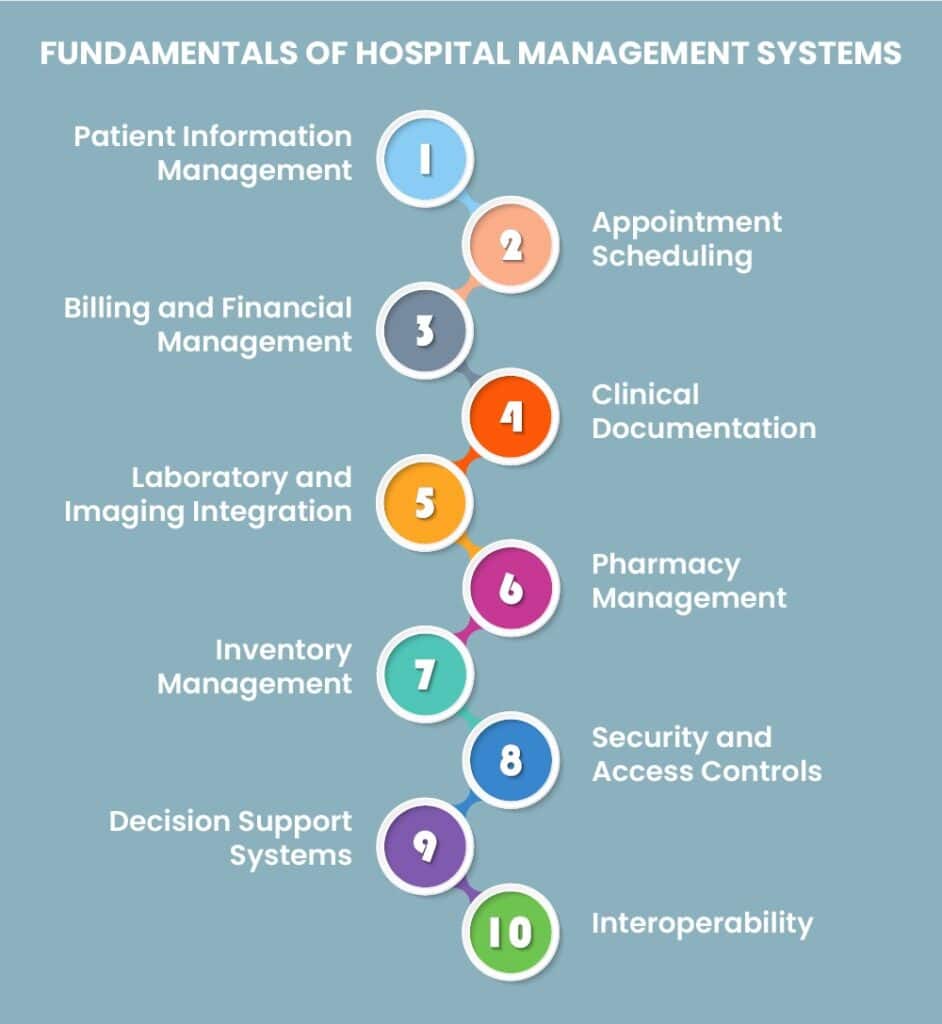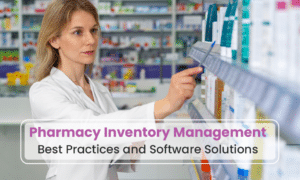
Welcome to our exploration of the dynamic field of Hospital Information System (HIMS), where the fusion of technology and healthcare excellence takes center stage. This blog immerses us in the pivotal domain of hospital information management systems, shedding light on innovative solutions revolutionizing the landscape of healthcare institutions. From optimizing administrative processes to elevating patient care, we take you on the journey to uncover the tools and technologies that empower hospitals to provide wholesome and patient-centric services in the digital era. Whether you’re a healthcare professional, tech enthusiast, or someone intrigued by the intersection of technology and healthcare, this blog is dedicated to unravelling the intricacies and advancements within the realm of Hospital Management Systems. Step into a future where technology and healthcare converge to enhance patient outcomes and operational efficiency.
Contents
- Revolutionizing Healthcare: The Power of Hospital Management Systems
- Fundamentals of Hospital Management Systems
- What is a Hospital Management System (HMS) and Electronic Health Record (EHR)?
- Features of Hospital Information Management System (HIMS)
- Exploring Customized and Free Online Hospital Management Systems
- Final Words
Fundamentals of Hospital Management Systems:
Hospital Management Information Systems (HMS) are comprehensive software systems designed to streamline and optimize various aspects of healthcare administration. Here are some fundamental aspects of HIMS software systems:

Patient Information Management:
– Centralizes and manages patient records, including demographics, medical history, treatments, and medications.
– Ensures quick access to accurate patient information.
Appointment Scheduling:
– Facilitates efficient appointment scheduling, helping manage patient appointments and optimize resource utilization.
Billing and Financial Management:
– Automates billing processes, from generating invoices to managing payments and claims.
– Ensures accuracy, transparency, and compliance with financial regulations.
Clinical Documentation:
– Allows for digital documentation of clinical information, enhancing communication among healthcare providers.
– Ensures comprehensive and accessible record-keeping.
Laboratory and Imaging Integration:
– Integrates with laboratory and imaging systems for seamless sharing of test results and images.
– Promotes collaboration and timely decision-making.
Pharmacy Management:
– Assists in managing pharmacy-related tasks, such as medication orders, dispensing, and inventory control.
– Ensures efficient medication management and reduces errors.
Inventory Management:
– Aids in managing and optimizing inventory levels of medical supplies, reducing waste.
Security and Access Controls:
– Incorporates robust security features to safeguard patient data.
– Implements access controls to ensure only authorized personnel have access to sensitive information.
Decision Support Systems:
– Provides tools for data analysis and reporting, offering insights into hospital operations, patient outcomes, and resource utilization.
– Supports informed decision-making.
Interoperability:
– Supports interoperability, enabling seamless integration with other healthcare systems and external entities.
– Fosters communication and data exchange across the healthcare ecosystem.
What is a Hospital Management System (HMS) and Electronic Health Record (EHR)?

Hospital Management System
A HIMS is an integrated solution designed to efficiently manage hospital resources and functions by consolidating various hospital departments into a single software platform. This system simplifies healthcare professionals’ tasks and their interactions with patients through automated functionality, focusing on supporting effective decision-making and enhancing workflow across different hospital departments and medical tasks.
Electronic Health Record
As for the Electronic Health Record (EHR), it refers to computer software utilized for capturing, storing, and sharing structured patient data. EHRs enable the sharing of medical information among authorized parties involved in patient care, including clinicians, labs, pharmacies, emergency rooms, nursing homes, and patients themselves. These records also contribute to care-related activities, supporting evidence-based decision-making, quality management, and outcomes tracking. EHRs mark a significant advancement in healthcare, promising to improve the doctor-patient relationship by providing timely and accessible data, enabling informed choices and delivering excellent care.
Benefits of Hospital Management System and Electronic Health Records:
The implementation of Hospital Management Software (HMS) projects brings a host of benefits to healthcare facilities, amplifying service quality and operational efficiency. This software is intricately designed to cater to three primary user categories: patients, hospital staff and management, and third-party providers, including pharmaceutical and insurance companies, collectively influencing and optimizing overall performance.
Simultaneously, Electronic Health Records (EHRs) contribute significantly to the improvement of patient care. Particularly advantageous when a patient is under the care of multiple healthcare professionals, EHRs simplify the tracking of comprehensive medical histories, encompassing allergies, blood type, treatment plans, past procedures, and other critical information. By allowing various care providers, regardless of location, to access a patient’s records concurrently, EHRs not only streamline information management but also foster collaboration among healthcare professionals, leading to more coordinated and efficient healthcare delivery.
Explore in detail Hospital Management System & Electronic Health Records (ezovion.com)
Features of Hospital Information Management System (HIMS)
Hospital Management Systems (HMS) are equipped with an array of indispensable features that streamline and enhance the overall healthcare management process. The dashboard serves as a centralized hub, offering a comprehensive overview of critical information. Analytics and Reports provide valuable insights for informed decision-making. Patient Registration and Appointment Management simplify administrative tasks, while Queue Management ensures a systematic flow of patients. Prescription Management and Clinical Decision Support facilitate efficient healthcare delivery.
The integration of Telemedicine brings healthcare services to a digital platform. Billing Management and Communication Management streamline financial transactions and enhance internal communication. Electronic Health Record Management ensures organized and accessible patient data. Vital Monitoring, Ward or Bed Management, and Operation Theatre Management optimize patient care within the hospital. Specialized modules like Cath Lab Management, Blood Bank Management, Insurance Processing, Medical Camp Management, Pathology Lab Management, and Pharmacy Management cater to specific healthcare needs. Inventory Management maintains efficient stock levels. Mobile Apps for doctors and patients, Patient Portals, and Healthcare Workforce Management contribute to a seamless healthcare ecosystem. These features collectively constitute the fundamental backbone of a robust Hospital Management System.
Dashboard:
Provides a centralized overview of critical information for efficient monitoring.
Analytics and Reports:
– Offers tools for data analysis and generates insightful reports to aid decision-making.
Patient Registration:
– Streamlines the process of registering and managing patient information.
Appointment Management:
– Facilitates the scheduling and organization of patient appointments.
Queue Management:
– Ensures a systematic flow of patients within the healthcare facility.
Prescription Management:
– Manages and tracks prescriptions for effective medication administration.
Clinical Decision Support:
– Assists healthcare professionals with clinical decision-making processes.
Tele-medicine:
– Integrates telehealth services, enabling remote healthcare consultations.
Billing Management:
– Handles financial transactions, including invoicing and payment processing.
Communication Management:
– Enhances internal communication among healthcare staff for efficient coordination.
Electronic Health Record Management:
– Organizes and maintains electronic health records for accessible patient data.
Patient Vital Monitoring and Management:
– Monitors and manages patient vital signs for comprehensive care.
Bed Management:
- Get real-time occupancy for efficient bed management.
Ward or Bed Management:
– Optimizes the allocation and management of hospital beds and wards.
Operation Theatre Management:
– Coordinates and manages activities within hospital operation theatres.
Cath Lab Management:
– Specialized module for the management of cardiac catheterization laboratories.
Blood Bank Management:
– Tracks blood inventory and manages blood bank operations.
Insurance Processing:
– Streamlines the processing of insurance claims and information.
Medical Camp Management:
– Organizes and manages healthcare camps and outreach programs.
Pathology Lab Management:
– Handles operations and data management in pathology laboratories.
Pharmacy Management:
– Manages pharmacy operations, including inventory and dispensing.
Inventory Management:
– Optimizes stock levels of medical supplies and equipment.
Mobile App for Doctors & Patients:
– Provides mobile applications for enhanced accessibility and interaction.
Patient Portal:
– Offers a secure online portal for patients to access their health information.
Healthcare Workforce Management:
– Manages schedules, tasks, and resources for healthcare staff.
These key features collectively contribute to the functionality and efficiency of a comprehensive Hospital Management System. Explore in detail the Features of the Hospital Management System (ezovion.com)
Exploring Customized and Free Online Hospital Management Systems

Let’s delve into the distinctions between a Customized Hospital Information Management System and a Free Online Hospital Information Management System.
Customized HMS:
A Customized Hospital Information Management System is a meticulously organized centralized platform designed and programmed to efficiently handle daily hospital operations and activity management. This comprehensive system oversees inpatient and outpatient management, record-keeping, treatment plans, illness statuses, pharmacy, radiology, and lab billings. It stores crucial hospital information, including patient demographics, clinical data, vitals, case sheets, visit history, ward details, attending doctors, accounts, and department administration. Essentially, the Hospital Management System (HMS) provides an intuitive solution for holistic hospital management, addressing diverse challenges. The goal is to simplify clinician workflows, reduce administrative costs, minimize errors, and enhance the overall patient experience.
Free Online HMS:
Free Online Hospital Systems, also known as open-source software, are solutions with publicly accessible source code, allowing anyone to view and modify it for their specific needs. While these systems offer the advantage of leveraging the latest technology at a lower cost, they come with considerations. Users can track patient data, visits, hospitalizations, medications, and lab results to support the day-to-day activities of hospital staff. However, it’s important to note that free hospital information software may lack robust security measures and database backups. There is also a risk that patient data could be compromised or sold in the market for profit. Users need to weigh the benefits and potential drawbacks before opting for a free online hospital management system.
Advantages of Opting for a Tailored Solution Aligned with Your Unique Requirements:

- A customized solution is built to address your specific needs, ensuring precision and relevance to your unique business requirements.
- Tailored solutions are designed to streamline your processes, leading to increased efficiency and productivity within your organization.
- Customized solutions can be scaled to accommodate your growing needs, providing flexibility and adaptability as your business evolves.
- While initial development costs may be involved, a customized solution can be more cost-effective in the long run, eliminating the need for unnecessary features or licenses.
- Customization allows for a user-friendly interface and experience, aligning the solution with the preferences and workflows of your team.
- Tailored solutions seamlessly integrate with your existing systems, ensuring a smooth transition and continuity in operations.
- Customized solutions can prioritize and strengthen security features, addressing specific vulnerabilities and safeguarding your business data.
- Tailored solutions can be developed to comply with industry-specific regulations, ensuring that your business operates within legal and ethical frameworks.
- Meeting your unique needs directly translates to improved customer satisfaction, as the solution aligns closely with the expectations and requirements of your clientele.
- With a customized solution, you typically receive ongoing support and updates, ensuring that your system remains optimized and relevant over time.
- Customization provides a competitive advantage by offering a unique solution that sets your business apart from competitors using generic off-the-shelf options.
- Customized solutions can be designed and implemented more quickly than trying to adapt generic solutions to fit your specific needs.
Choosing a customized solution tailored to your unique needs empowers your business with a strategic advantage, enabling you to operate more efficiently, securely, and in alignment with your organizational goals. For more detailed information check our blog post Customized or Free Online Hospital Management System? (ezovion.com)
Final Words
Elevate the efficiency and intelligence of your healthcare delivery with the implementation of an Intelligent Hospital Management System. This comprehensive system is designed to revolutionize healthcare operations, offering tailored solutions to meet the unique needs of your facility. By incorporating smart features like streamlined patient management, advanced analytics, and automated workflows, the Intelligent Hospital Management System enhances overall operational efficiency, reduces errors, and ensures a seamless patient experience. Stay ahead in healthcare innovation, optimize resource utilization, and provide high-quality patient care through the transformative capabilities of an Intelligent Hospital Management System.
Make your Healthcare Delivery Smart with an Intelligent Hospital Information Management System
Make your Healthcare smart with Hospital Management solutions (ezovion.com)
Transform your healthcare operations and enhance patient care by adopting an Intelligent Hospital Management System. This innovative system offers tailored solutions to meet your facility’s unique needs, incorporating smart features and advanced technologies.
Here are key highlights:
- Efficiently handle patient records, appointments, and treatment plans for a seamless healthcare experience.
- Leverage data analytics for valuable insights into hospital operations, resource utilization, and patient outcomes.
- Integrate smart automation to streamline administrative tasks, reduce errors, and optimize workflow efficiency.
- Enhance overall efficiency in hospital operations, from registration to discharge, by leveraging intelligent features.
- Minimize errors in documentation, billing, and patient care through the intelligent automation of routine tasks.
- Ensure a positive patient experience by providing personalized and efficient healthcare services.
- Optimize the allocation and utilization of resources, including staff, equipment, and facilities.
- Benefit from a system that can adapt to evolving healthcare needs and scale to accommodate growth.
- Implement real-time monitoring of patient vitals and hospital activities for prompt decision-making.
- Stay at the forefront of healthcare innovation by incorporating intelligent technologies into your hospital management.
Improve patient outcomes, boost operational efficiency, and embrace the future of healthcare delivery with the intelligent features of a Hospital Management System tailored to your specific needs.
You can check the details regarding the Hospital Management System here>
All About Efficient Hospital Management System (HMS) | Ezovion









